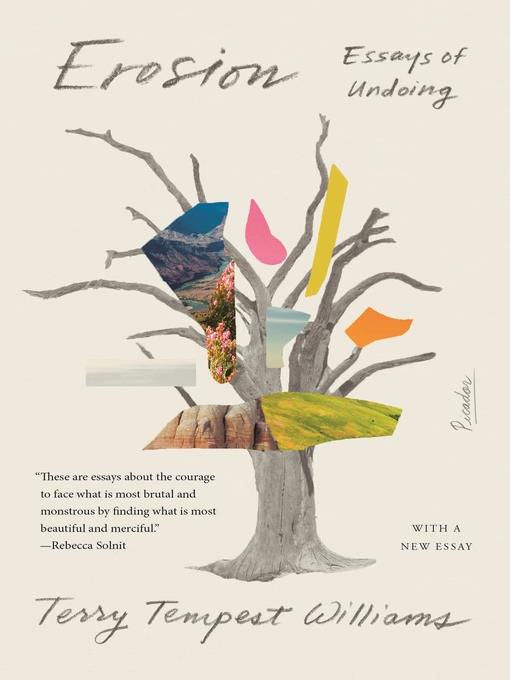
Erosion
Essays of Undoing
کتاب های مرتبط
- اطلاعات
- نقد و بررسی
- دیدگاه کاربران
نقد و بررسی

August 15, 2019
New and previously published essays from the well-known conservationist alternately rage and despair over national policies of land and wildlife conservation. The election of Donald Trump spelled a dark moment for environmentalists like Williams (Writer-in-Residence/Harvard Divinity School; The Hour of Land: A Personal Topography of America's National Parks, 2015, etc.), who increasingly sees a "world torn to pieces." The erosion of the protection of public lands, most recently that of Utah's Bears Ears National Monument, has compelled the author to become increasingly political, sometimes to the detriment of her personal life. When her longtime husband, Brooke, said that she "was too immersed in politics--'obsessed' was the word he used--and that it wasn't healthy," her response was telling: "We have to keep fighting....It's not just about our species." Owls, for which Williams has a particular affinity, would agree, as would countless other species, such as prairie dogs, wolves, and sage grouse, all of which suffer from the erosion of the Endangered Species Act (1973). A "totemic act," it has "never been more relevant and never more at risk." These essays--written between 2016 and 2018 and mostly high quality--take readers to extraordinary places, including the Great Salt Lake and surrounding areas; Jackson Hole, Wyoming, where she saw "one constant: pronghorns"; the Alaskan Brooks Range ("in the Arctic, global warming is not an abstraction"); the Galápagos Islands, where the author discovered countless wonders on land and at sea; the Virunga Mountains of Rwanda, where she observed gorillas amid a war-torn country bleeding itself for charcoal production. Elsewhere, she writes about how she confronted the religious politics of the Latter-day Saint patriarchy in Utah, where she lived, forcing her to leave her professorship for the unknown. She also confronts the traumatic, untimely death of her brother by suicide in 2018. Though the book contains mostly prose, there is also poetry and a long Q-and-A with fellow environmentalist Tim DeChristopher. Not every piece is a winner, but this anthology of grief, anger, and even hope capably reflects Williams' wise voice.
COPYRIGHT(2019) Kirkus Reviews, ALL RIGHTS RESERVED.

October 1, 2019
Naturalist, educator, and prolific writer Williams (e, g., Finding Beauty in a Broken World) delivers essays and poems originally published between 2012 and 2019. Here, erosion is a metaphor for the loss of various values. A subtheme is the disputed value of rural public lands, with high-stakes clashes between people who appreciate wilderness and those determined to exploit its resources. Williams is particularly concerned with the struggle around the Grand Staircase-Escalante National Monument and the Bears Ears National Monument, in the high desert of southeast Utah. Republicans and some federal agencies want to reduce the protected areas to extend access for mining, and petroleum and water extraction. The author recounts some of her environmental activities, including guerrilla-style purchase of petroleum leases on tracts of public property, to actually preserve them from drilling. The leases were denied, but that decision is being appealed in court. Other essays contain lyrical descriptions of nature in various locations around the world, decrying human hubris and the damage being caused by climate change. VERDICT These essays are wide ranging and heartfelt and will attract dedicated environmentalists.--David R. Conn, formerly with Surrey Libs., BC
Copyright 2019 Library Journal, LLC Used with permission.

Starred review from September 1, 2019
An apostle of life and earth and a soul-revving teller of true stories, Williams (The Hour of Land, 2016) brings lyricism, candor, mystery, and factual exactitude to the deeply affecting essays collected here, all written between 2012 and 2019. Currently writer-in-residence at Harvard Divinity School, she traces the nexus between beauty and spirit and explains lucidly and passionately why it's essential for humanity to conserve nature on our warming planet. She reflects on how the bipartisan-supported Endangered Species Act and Wilderness Act have been saving lives and land for more than four decades, yet are now under attack, as are precious public lands. Exalting in her Utah home and the West at-large, she decries their increasingly reckless exploitation by the carbon industry. Williams reports on enlightening forays in the Arctic, Gal�pagos Islands, Rwanda, and China, and shares, with profound resonance, her brother's suicide and the harsh consequences of her and her husband's protest purchase of oil and gas leases. Williams takes readers far beyond the expected, illuminates unforeseen connections, and rejects despair, embracing, instead, attentiveness and action. Ultimately, Williams discerns that the now prevailing force of erosion can be liberating, observing, We are eroding and evolving, at once. Williams' exquisite testimony of wonder and wisdom is vitalizing and crucial.(Reprinted with permission of Booklist, copyright 2019, American Library Association.)

























دیدگاه کاربران